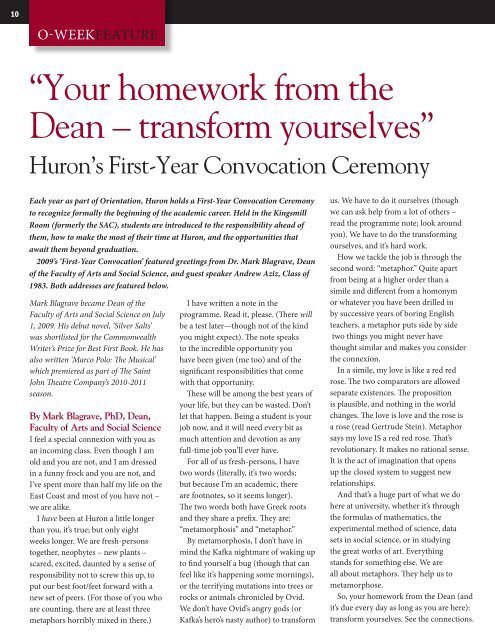Ramona Lumpkin, PhD Principal, Huron University College 2001 ...
Ramona Lumpkin, PhD Principal, Huron University College 2001 ...
Ramona Lumpkin, PhD Principal, Huron University College 2001 ...
Create successful ePaper yourself
Turn your PDF publications into a flip-book with our unique Google optimized e-Paper software.
10<br />
O-WeeKFeATURe<br />
“Your homework from the<br />
dean – transform yourselves”<br />
<strong>Huron</strong>’s first-Year convocation ceremony<br />
Each year as part of Orientation, <strong>Huron</strong> holds a First-Year Convocation Ceremony<br />
to recognize formally the beginning of the academic career. Held in the Kingsmill<br />
Room (formerly the SAC), students are introduced to the responsibility ahead of<br />
them, how to make the most of their time at <strong>Huron</strong>, and the opportunities that<br />
await them beyond graduation.<br />
2009’s ‘First-Year Convocation’ featured greetings from Dr. Mark Blagrave, Dean<br />
of the Faculty of Arts and Social Science, and guest speaker Andrew Aziz, Class of<br />
1983. Both addresses are featured below.<br />
Mark Blagrave became Dean of the<br />
Faculty of Arts and Social Science on July<br />
1, 2009. His debut novel, ‘Silver Salts’<br />
was shortlisted for the Commonwealth<br />
Writer’s Prize for Best First Book. He has<br />
also written ‘Marco Polo: The Musical’<br />
which premiered as part of The Saint<br />
John Theatre Company’s 2010-2011<br />
season.<br />
By Mark Blagrave, <strong>PhD</strong>, Dean,<br />
Faculty of Arts and Social Science<br />
I feel a special connexion with you as<br />
an incoming class. even though I am<br />
old and you are not, and I am dressed<br />
in a funny frock and you are not, and<br />
I’ve spent more than half my life on the<br />
east Coast and most of you have not –<br />
we are alike.<br />
I have been at <strong>Huron</strong> a little longer<br />
than you, it’s true; but only eight<br />
weeks longer. We are fresh-persons<br />
together, neophytes – new plants –<br />
scared, excited, daunted by a sense of<br />
responsibility not to screw this up, to<br />
put our best foot/feet forward with a<br />
new set of peers. (For those of you who<br />
are counting, there are at least three<br />
metaphors horribly mixed in there.)<br />
I have written a note in the<br />
programme. Read it, please. (There will<br />
be a test later—though not of the kind<br />
you might expect). The note speaks<br />
to the incredible opportunity you<br />
have been given (me too) and of the<br />
significant responsibilities that come<br />
with that opportunity.<br />
These will be among the best years of<br />
your life, but they can be wasted. Don’t<br />
let that happen. Being a student is your<br />
job now, and it will need every bit as<br />
much attention and devotion as any<br />
full-time job you’ll ever have.<br />
For all of us fresh-persons, I have<br />
two words (literally, it’s two words;<br />
but because I’m an academic, there<br />
are footnotes, so it seems longer).<br />
The two words both have Greek roots<br />
and they share a prefix. They are:<br />
“metamorphosis” and “metaphor.”<br />
By metamorphosis, I don’t have in<br />
mind the Kafka nightmare of waking up<br />
to find yourself a bug (though that can<br />
feel like it’s happening some mornings),<br />
or the terrifying mutations into trees or<br />
rocks or animals chronicled by Ovid.<br />
We don’t have Ovid’s angry gods (or<br />
Kafka’s hero’s nasty author) to transform<br />
us. We have to do it ourselves (though<br />
we can ask help from a lot of others –<br />
read the programme note; look around<br />
you). We have to do the transforming<br />
ourselves, and it’s hard work.<br />
How we tackle the job is through the<br />
second word: “metaphor.” Quite apart<br />
from being at a higher order than a<br />
simile and different from a homonym<br />
or whatever you have been drilled in<br />
by successive years of boring english<br />
teachers, a metaphor puts side by side<br />
two things you might never have<br />
thought similar and makes you consider<br />
the connexion.<br />
In a simile, my love is like a red red<br />
rose. The two comparators are allowed<br />
separate existences. The proposition<br />
is plausible, and nothing in the world<br />
changes. The love is love and the rose is<br />
a rose (read Gertrude Stein). Metaphor<br />
says my love IS a red red rose. That’s<br />
revolutionary. It makes no rational sense.<br />
It is the act of imagination that opens<br />
up the closed system to suggest new<br />
relationships.<br />
And that’s a huge part of what we do<br />
here at university, whether it’s through<br />
the formulas of mathematics, the<br />
experimental method of science, data<br />
sets in social science, or in studying<br />
the great works of art. everything<br />
stands for something else. We are<br />
all about metaphors. They help us to<br />
metamorphose.<br />
So, your homework from the Dean (and<br />
it’s due every day as long as you are here):<br />
transform yourselves. See the connections.


